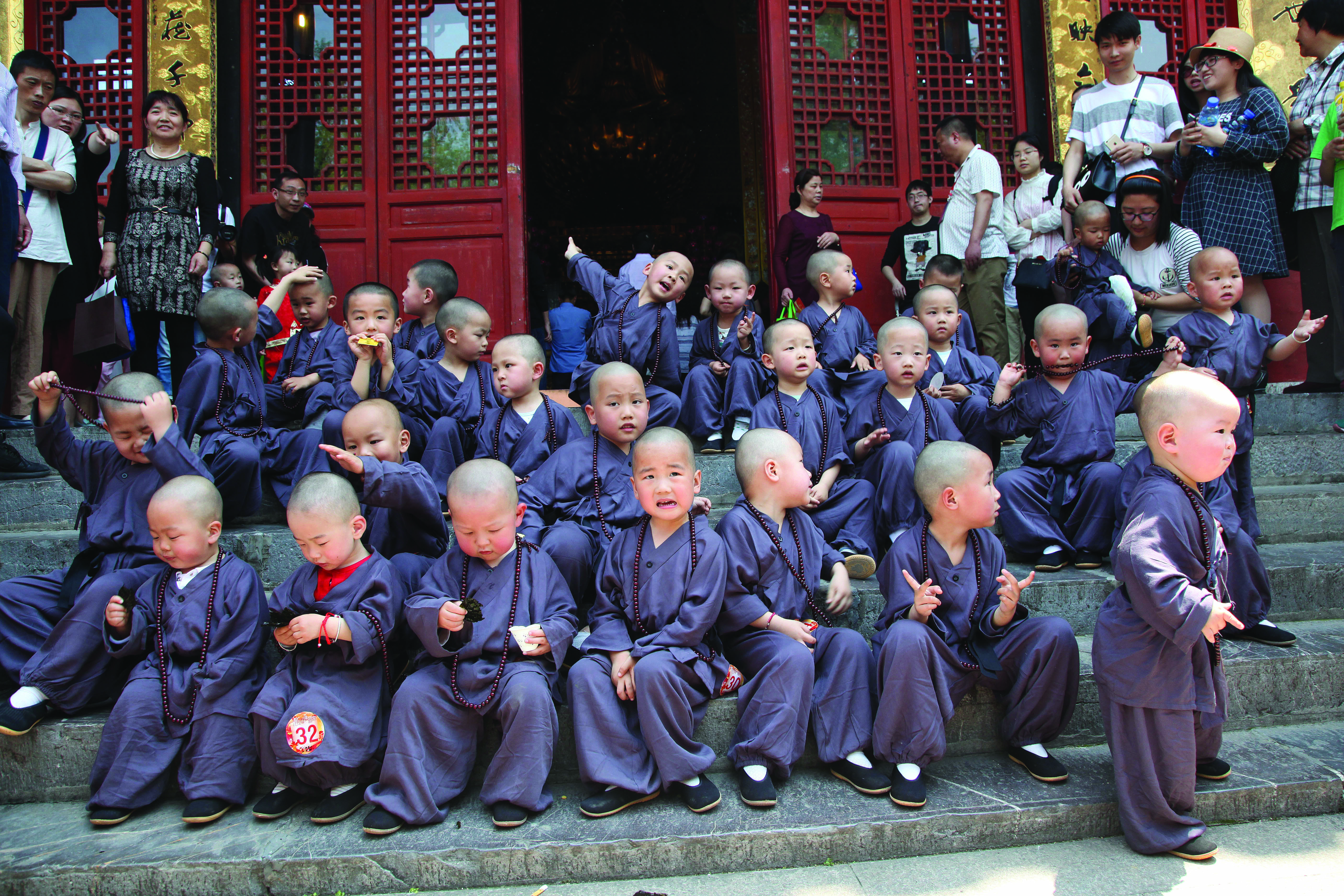Mummified Monk Gilded in Gold Leaf
In 2012, a revered Buddhist monk named Fu Hou died in the southeastern Chinese city of Quanzhou. He was 94 years old and had practiced Buddhism for 77 years at Chongfu Temple. To recognize his commitment to the dharma, his temple decided to bestow him with an honor reserved for the holiest monks.
Following his death, Fu Hou’s body was washed, treated by mummification experts, and sealed inside a large pottery jar, where it remained, legs crossed in the lotus position, for more than three years. When the jar was finally opened in a public ceremony, the body was found intact, with little skin deterioration: a sign, according to local belief, that Fu Hou was a truly virtuous monk. The mummified body was washed with alcohol, covered in layers of gauze and lacquer, and gilded in gold leaf. The golden statue now sits on a mountain to await those who seek to pay tribute.

On the Lookout for the “Most Lovely Buddhist Baby”
Who is the cutest Buddhist of them all? This year in the Chinese city of Nanjing, 50 Buddhas-to-be competed to see who would win the title of “Most Lovely Buddhist Baby.” Sporting the shaved heads and purple robes of monastics, the group of 3- to 5-year-olds tasted vegetarian cuisine, donned their prayer beads, and posed for photographers. (The photos were posted online for the public to vote on who wore it best.) At press time, the winner had yet to be announced, but we’re pretty sure that external recognition won’t matter to the mini-meditator.
Buddhist Monks Bless Soccer Stars
Leicester City, a Thai-sponsored British soccer club, was a 5,000-to-1 outsider at the beginning of this year’s English Premier League championship. In more than 130 years of existence, the club had not won a single championship title. That low standing was upended this year when Vichai Srivaddhanaprabha, the Thai billionaire who owns the team, invited Buddhist monks to bestow sacred cloths upon the players and bless the opening pitch. He felt that lack of merit had contributed to the team’s low seed, so he decided to generate good karma by building temples and giving alms to support monks domestically and abroad. While some credit the team’s upset championship win over Everton Football Club to buckets of sweat and the inspirational leadership of their Italian manager, Claudio Ranieri, others feel it was the monks’ divine influence that had altered their play.
 The Obamas Honor Buddhist Holiday
The Obamas Honor Buddhist Holiday
President Barack Obama and First Lady Michelle Obama made American (Buddhist) history in May when they issued a message from the White House acknowledging Vesak, or “Buddha Day,” which honors the birth, enlightenment, and death of the Buddha. Buddhists worldwide celebrate the holiday by reflecting on virtues like courage, wisdom, and compassion; by giving offerings to monastics; and by engaging in devotional acts of prayer and meditation. The president’s letter commemorates “the proud traditions of Buddhism” [which] “contribute to the diversity of cultures and religions that define our common humanity.”
Buddhism Takes on the Gospel
While Buddhism continues to gather followers from Quebec to California, in some countries east of the Greenwich Meridian the number of Buddhist practitioners is on the decline. In Singapore, the Buddhist population has decreased steadily over the past decade. But an enterprising group of Buddhist musicians from Singapore, Malaysia, and Indonesia has made it its mission to reverse this trend. Inspired by the success that Christian worship music has had in attracting young people to the word of God, a group of Buddhist organizations joined forces to put on a song-and-dance performance called “Sadhu for the Music.” Directed by an internationally acclaimed Malaysian Buddhist singer, Imee Ooi, the show featured songs crafted with the dharma in mind, many including chants from the sutras. The hope is that by bringing Buddhist music directly to the younger population (via their smart phones and earbuds), the show will have created a new method of “spreading the gospel.”
Thank you for subscribing to Tricycle! As a nonprofit, we depend on readers like you to keep Buddhist teachings and practices widely available.

